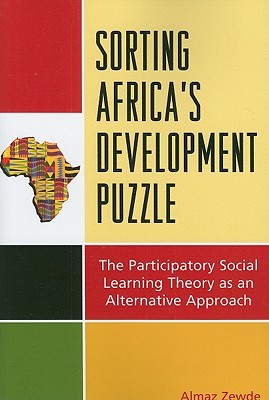
- We will send in 10–14 business days.
- Author: Almaz Zewde
- Publisher: University Press of America
- ISBN-10: 0761849076
- ISBN-13: 9780761849070
- Format: 16 x 22.7 x 1.7 cm, softcover
- Language: English
- SAVE -10% with code: EXTRA
Reviews
Description
Sorting Africa's Development Puzzle: The Participatory Social Learning Theory as an Alternative Approach is a comprehensive exploration of why Africa has not managed to achieve a sustainable and self-regenerating development over the past half-century of effort. The work situates the problems of Africa's persistent underdevelopment in the practices employed by national political elites, donors, and lenders to African development that played roles in determinant policy and planning. Unlike many newly developed countries and regions, and contrary to the historical experiences of developed countries where ordinary people were full stakeholders and drivers of development, Africa's development has been top-down, expert and capital driven, mechanical, and typically externally designed. Ordinary Africans were made marginal to development. This approach to Africa's development was devoid of building the people and their institutions as the legitimate means of development. The entrusting of Africa's development to local and international elites to the exclusion of the people from decision-making and full participation, has led to grievous deficits in the formation of human and social capital, and legitimate economic, social, and political institutions for development. The book offers a studied alternative that can positively change Africa's development direction - The Participatory Social Learning Approach. The philosophical, theoretical, historical and heuristic origins of this alternative are offered in detail within this book.
EXTRA 10 % discount with code: EXTRA
The promotion ends in 9d.04:17:10
The discount code is valid when purchasing from 10 €. Discounts do not stack.
- Author: Almaz Zewde
- Publisher: University Press of America
- ISBN-10: 0761849076
- ISBN-13: 9780761849070
- Format: 16 x 22.7 x 1.7 cm, softcover
- Language: English English
Sorting Africa's Development Puzzle: The Participatory Social Learning Theory as an Alternative Approach is a comprehensive exploration of why Africa has not managed to achieve a sustainable and self-regenerating development over the past half-century of effort. The work situates the problems of Africa's persistent underdevelopment in the practices employed by national political elites, donors, and lenders to African development that played roles in determinant policy and planning. Unlike many newly developed countries and regions, and contrary to the historical experiences of developed countries where ordinary people were full stakeholders and drivers of development, Africa's development has been top-down, expert and capital driven, mechanical, and typically externally designed. Ordinary Africans were made marginal to development. This approach to Africa's development was devoid of building the people and their institutions as the legitimate means of development. The entrusting of Africa's development to local and international elites to the exclusion of the people from decision-making and full participation, has led to grievous deficits in the formation of human and social capital, and legitimate economic, social, and political institutions for development. The book offers a studied alternative that can positively change Africa's development direction - The Participatory Social Learning Approach. The philosophical, theoretical, historical and heuristic origins of this alternative are offered in detail within this book.


Reviews